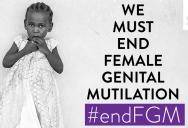
Zero tolerance for female genital mutilation, say S&Ds
Date
Mon, 02/05/2018
Sections
Health & Consumers
Justice & Home Affairs
Speaking ahead of the International Day of Zero Tolerance for Female Genital Mutilation, 6 February, on which the European Parliament has tabled an oral question to the European Commission requesting a progress report on the issue, Iratxe García Pérez, S&D MEP and spokesperson on women’s issues said:
“Every day, 6000 girls fall victim to the horrible practice of genital mutilation with nearly a quarter of them under the age of 14. This barbarian practice is known to cause lifelong physical and psychological pain.
“We expect answers from the Commission on what progress they have achieved under their strategy ‘Towards the elimination of female genital mutilation (FGM)’. Of course, the Commission cannot do it alone. The key to success is that female genital mutilation prevention is mainstreamed into all relevant policy areas and the EU works hand in hand with member states, the UN, NGOs and other partners. Especially, the EU's external action must be committed to empowering women and promoting women's rights in our co-operation with third countries with the aim of eradicating female genital mutilation by law and in practice.
“We call on the Commission to use the EU's tools and resources and member states to throw their power behind the campaign to eradicate female genital mutilation. Each one of us will have to answer if we have done enough to safe young girls from the harmful consequences of female genital mutilation. Now is the time to act.”
The Socialists and Democrats Group will host an event in the European Parliament in Strasbourg on Tuesday, the 6th of February 2018 to raise FGM awareness. For more information click here.
Note to the editor:
Female genital mutilation (FGM) comprises all procedures involving partial or total removal of the female external genitalia or other injury to the female genital organs for non-medical reasons, as defined by the World Health Organisation (WHO).
FGM is carried out for cultural, religious and/or social reasons on young girls between infancy and the age of 15. FGM constitutes a form of child abuse and violence against women and girls; it has severe short-term and long-term physical and psychological consequences.
According to WHO, 140 million women and girls worldwide are currently living with the harmful consequences of FGM, while the European Institute for Gender Equality (EIGE) reports victims in at least 13 EU countries.
In February 2015 the Commission last updated the European Parliament about its action on the elimination of female genital mutilation undertaken under its strategy ‘Towards the elimination of female genital mutilation’. Tomorrow, marking the International Day Against FGM, we would like to ask the Commission to give us an overview of the progress and actions taken since then.

